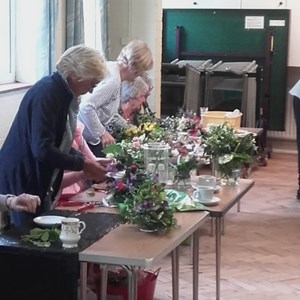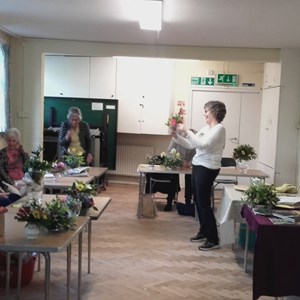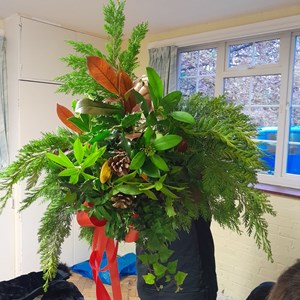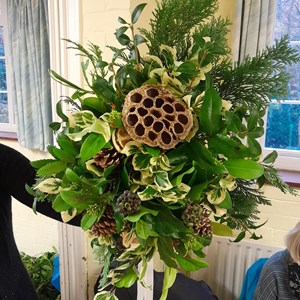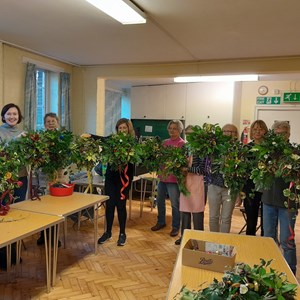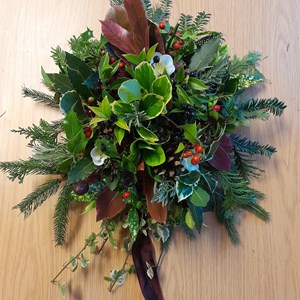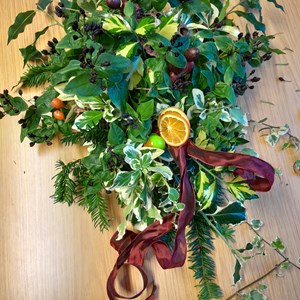Past Events
Talks
Dahlias by Richard Ramsey March 2022
Spring Ideas by Simon Horrill October 2022 and Big Ideas October 2023
Clematis through the seasons by Everett Leeds Feb 2023
50 shades of Grey ( shady plants ) by Colin Moat March 2023
Gardens of Surrey by Cherrill Sands a local consultant garden historian August 2023
Brussel Sprouts to Tangerines by Jacqueline Aviolet December 2023 and I am a Tulip Feb 2025
Dan Cooper Containers in the Garden March 2024
AGM 14 August 2024 a Beekeeping Challenges 2024 Pauline Lane and Peter Jones
Steve Edney - The Long Border September 2024
Caroline Halfpenny Scentsational Gardening November 2024
Lynne Moore of Moore and Moore plant nursery - A Blessing in Disguise - A shady spot is the perfect place to grow some unusual and beautiful perennials March 2025
A note from Lynne after the talk
Just wanted to say a big thank you to you for the invitation to come and speak to the group and for the warm welcome extended to Steve and I by everyone. What a lovely, friendly group.
Annual General Meeting 13 August 2025 followed by a talk Colours by Simon Horrill ( who you may recall has talked to us in the past- an ex ballet dancer turned garden designer )
Colour - a talk looking at what colour is, how colours can change the feel of our outdoor space and different ways we might combine colours .
Caroline Halfpenny Saturday 4 October 2025 talking about Garden Design Techniques - the use of plants in Design
This a return visit by Caroline who talked about scented plants in the garden in 2024 which was a delight to attend and very interesting. About 30 people attended and were entertained for an hour about plants in Design - very informative , with some good ideas to translate to our own gardens. Hopefully we will be able to invite Caroline back again in 2026/2027.
Caroline is passionate about gardening and the landscape, she began her horticultural career with Gravesham Borough Council with responsibility for the Grounds Maintenance Contracts from the Riverside out to Camer Park. In addition she managed to secure the role of Allotments Officer which she loved, as she enjoys growing fruit and vegetables and wandering round allotments was a dream job. She was guilty of organising the daffodils growing through the verges from Meopham to Gravesend (cheeky as it was her route to work).
She then became a self employed gardener while she completed her degree in Landscape Management and became a Mum.
From 2007 to 2014 she managed the Diploma in Horticulture at Hadlow College at both the Tonbridge and Canterbury site, in addition to lecturing at all levels from schools and Foundation through to Higher Education. She still lectures part time today as well as running Growth Matters , which covers all her loves Gardening and Education.
1 November 2025 Barry Newman gave a talk on THE MODERN KITCHEN GARDEN
A general talk in three parts, covering the traditional approach to growing vegetables then moving on to container growing for those with limited space and finally to raised bed cultivation which I regard as the modern way ahead for those wishing to grow for the table.
Barry is a well known grower, exhibitor, lecturer and judge.
He is a member of the Royal Horticultural Society’s Fruit, Vegetable and Herb Committee and a former Chairman of the National Vegetable Society.
As well as being a senior NVS judge, Barry serves on the judging and lecturing panel of the RHS he is also a Britain in Bloom judge.
Barry was formally trained in horticulture at Pershore, York and Bath.
Much of his working life was in local authority amenity provision around the country, retiring in 2005.
In 2022 Barry was awarded the Kew Guild Medal for distinguished service to the horticultural industry.
Notes taken from Barry Newman’s talk ‘The Modern Kitchen Garden’ With raised beds no cultivated soil is wasted, since plants can be grown right up to the edge and they can be tended without walking on the bed – this avoids compaction and maintains good soil structure - just light superficial forking is needed, no digging. Raised beds can provide a good growing medium, no matter how bad the garden soil is, and drainage is improved. If you are putting raised beds on a slope, make sure that the beds are kept horizontal. For raised beds and containers planted to last more than one growing season, use a blend of 60% soil and 40% compost (using all compost would be too light to support plants and retain nutrients). Similar benefits can be achieved even in the smallest garden, by planting in containers, with the added advantage that they can be moved around the garden to make best use of them at various seasons. Many containers will benefit from a quarter turn every week to ensure equal exposure to sunlight, helping the plants develop more evenly. Paths between raised beds are best covered with wood chippings, providing good access in all weathers and eliminating the need to mow grass, get rid of weeds or combat slugs and snails, which cannot move over the wood chippings. Many vegetables can add to the aesthetic effect of beds or borders of ornamental plants, particularly useful where space is at a premium. Rhubarb – with, say, 3 crowns, one in turn can be forced each year to extend the season. Every fifth year rhubarb should be divided, to ensure a supply of tender shoots rather than the thick, tough ones produced as crowns get older. Barry has found Vitax Q4 the best general fertiliser for vegetables – for dry conditions it is better to use powder than pellets, as more moisture is needed to break the pellets down in order for the nutrients to become available. Courgettes grown vertically - trained up 7ft tree stakes - at the end of the season you will be picking courgettes at head height. Apart from the smaller space that this takes up, it is more difficult for slugs and snails to get to the courgettes, it avoids the mass of foliage on the ground, so conducive to rotting when it is wet, and weeding is easier. Likewise, Barry showed squash climbing up a hedge. The squash should be planted in soil enriched with manure or compost a couple of feet away from the hedge, with a support to lead them up to the hedge. Use a different part of the hedge each year. Training squash up against the side of a shed or similar would serve equally well. Barry introduced his bag growing system for potatoes. Not the bags sold for this purpose, to stand on a patio, where in sunny weather the soil inside could easily reach the temperature where tuber formation is inhibited. Instead, tough plastic bags are filled with compost and one seed potato is placed in the bottom of each. The bags are then half immersed in a prepared trench where the soil has been well fertilised; cuts are made in the bottom of the bags first, so that the roots will go out of the bag and develop in the trench. Most of the watering is made into the trench. There is no need for earthing up, as there is already sufficient depth of compost in the bags for the tubers to form. The haulms are held up, so that you do not get rotting leaves on the soil harbouring slugs. Just put your hand down in the bag to check whether the potatoes are ready for use. The bag can then be taken out of the trench with all the potatoes inside - none are left behind to appear in the middle of following year’s crop. Also, after lifting, the potatoes can be stored in the compost in the bag, with the haulms cut off and the roots removed. This compost can be reused for several years, since it is the soil in the trench that supplies the nutrients for the potatoes. As many grow-bags have just a thin layer of compost, Barry advocated bulking up the compost into about 2/3 of the grow-bag, folding the empty part of the bag underneath and just planting 2 tomato plants in the shortened bag. Then use plant rings to sit on top of the grow-bag. The outer ring is to water through, whilst the tomato plant grows through the inner ring – if this is filled with compost as the plant develops, the stem will form additional roots. The first truss of tomatoes is self-regulating, but subsequent trusses should be pinched out at 12 – 14 fruits. In the case of high potash feed for tomatoes, aubergines, peppers etc., applying a strong solution every week or so can give plants quite a shock – much better to use a more dilute solution for every watering. Hopefully these notes are useful reminders; unfortunately they cannot attempt to replicate Barry Newman’s excellent talk.
Roses Revisited ‘ – the old , the new and what to do’ A Talk by Gillian Taylor 31 January 2026
This is the story of how Gillian became a lover of Roses so that from having only two a few years ago she has progressed to growing around 250 varieties in her collection. The talk will discuss the diverse types of Rose that are available, where to buy them, how to use them in various garden settings, where to see them, their care, and suggestions for companion plants to use with them.
Gillian has provided a couple of fact sheets which are below
Workshops
Flower arranging workshop April 2022
Christmas workshops Dec 2022 and November 2023
Saturday 10th February 2024 – A discussion led by Sylvia Pocock (one of our show judges)
Sylvia, a RHS Judge generously ran an informal chat and workshop for 20 members which was warmly received , and we all picked up a few tips to help with this years shows.
Visits
Visit to Wisley by coach 14 July 2022
Self Drive to Munstead Wood, May 2023
Trip to RHS HYDE HALL July 2023
Self-drive visit to Heathside in Cobham 25 July 2023
Self-Drive to Orchard Cottage 28 May 2024
Self-Drive Visit to Tollsworth Manor, Chaldon 11 July 2024 ( on closed as Gordon is selling )
Coach Trip to West Dean 25 July 2024
28 January 2025
A visit to RHS Lindley Library 80 Vincent Square London SW1P 2PE @ 2.00 pm
The RHS Lindley Library is situated at 80 Vincent Square, London SW1P 2PE and is the largest Horticultural Library in the world. 15 members visited to see a selection of The “Treasures of the RHS Lindley Library” in a 60-minute visit during which a member of the Library team shared a selection of rare books, wonderful botanical artwork and objects from their world class archives and photographic collections with interesting stories attached.
Feedback from members was very positive " Yes, yesterday was brilliant! Hadn't realised what we'd be in for but thought the information received was very good. "
Hopefully we will arrange a future visit as they change the " book " on show regularly . If you would like to be included just let us know
Self-Drive to Shamley Wood Estate Guildford, Surrey, GU5 0SP on 22nd May @ 2.30pm which only opens by appointment.
A relative newcomer to NGS, this garden is worth visiting just for the setting! Sitting high on the North Downs, the garden enjoys beautiful views of the South Downs and is approached through a 10-acre deer park. Set within approximately 3 acres, there is a large pond and established rose garden. More recent additions include a stream, fire pits, dry garden, heather, cutting garden and woodland walk. There are a number of sculptures to find, including hippos and several pieces of driftwood art. A great afternoon enjoyed by all.
Coach Trip to Wisley 17th July
This year about 20 of us we visited Wisley , on a pleasant day , cool with a short rain shower ( which was lovely after the dry spell ) The M25 treated us very kindly with no delays which gave everyone time to visit the areas that took their fancy.
Self-Drive to Titsey Place in Oxted, Surrey, RH8 0SA. This an impressive manor house with beautiful gardens set in the stunning countryside of the North Downs, on 20th August 2025.
One of the largest surviving historical estates in Surrey. Magnificent ancestral home and gardens of the Gresham family since 1534. Stunning gardens including the walled kitchen gardens, landscaped lakes, and the Queen’s Golden Jubilee Rose Garden.15 acres of Formal and Informal gardens.
Our visit included a guided tour of the gardens, followed by a guided house tour. 26 people joined us for the tours , the garden tours concentrated on the walled gardens and Rory , the head gardener shared many tips . The House tour was interesting and the guides great and it is not often to get so close up to so many wonderful objects , and it was lovely to see the house is still used by the family.
Some feedback below
Thank you for organising such a lovely visit. Thoroughly enjoyed it. The house tour was excellent . the guides really knowledgeable. And the garden tour too . especially as the gathering of seed heads was allowed!!! I'm hoping to produce some of those gigantic poppy heads for myself next year!! Thank you.
